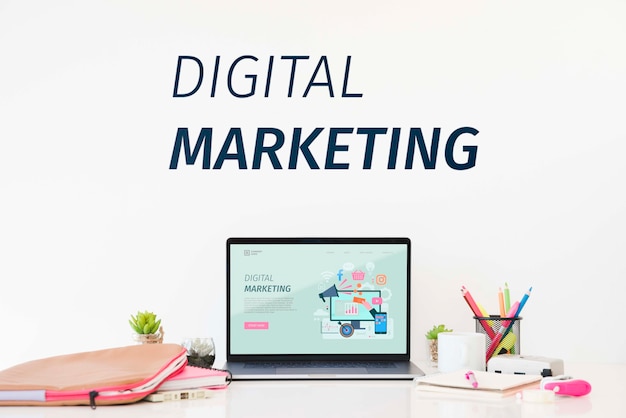Digital Marketing in Kenya: Strategies for Small Businesses
Grow your small business in Kenya with our proven digital marketing strategies for SEO, social media, email marketing, and more.

Introduction
As a small business in Kenya, staying competitive in today's online marketplace is critical to success. One of the most effective ways to do this is through digital marketing. However, with so many options available, it can be difficult to know where to start.
In this blog post, we look at the best internet marketing strategies for small businesses in Kenya, including SEO, social media marketing, email marketing, and more.
We'll also give you tips on how to effectively implement these strategies and measure their success. Whether you are just starting or looking to improve your existing online marketing efforts, this guide will give you the knowledge and tools you need to succeed.
SEO

Search engine optimization (SEO) is the process of optimizing your website to rank higher on search engine results pages (SERPs). In Kenya, Google is the dominant search engine, so it is wise to focus on optimizing your website for Google.
The following are some SEO strategies you can try:
On-site SEO optimization
On-page optimization involves making sure your website is properly structured and that all elements such as title tags, meta descriptions, and headings are optimized for search engines. This includes things like optimizing your website's URL structure, using header tags correctly, and tagging your images correctly.
Off-site optimization
Off-page optimization is the process of enhancing your website's visibility and authority through external factors. This includes backlink building, having a strong social media presence, getting listed in local directories, and building a strong brand reputation.
Technical SEO
Technical SEO is about making sure your website is technically sound and modified for search engines. This includes making sure that your website is mobile-friendly, loads quickly, and has no technical errors.
Local SEO
Local SEO is the process of optimizing your website for regional search queries. This is critical for small businesses in Kenya as it helps them reach customers in their immediate area.
Some powerful local SEO strategies:
-
Setting up a Google Business Profile account: Set up a Google My Business account to make your business more visible in local search results.
-
Optimizing your website's location pages: Create location-specific pages on your website that include information about your business, such as an address, phone number, and hours of operation.
-
Building local backlinks: Acquire backlinks from local websites, such as the chamber of commerce websites, to improve your local search rankings.
-
Encouraging customer reviews: Encourage customers to leave reviews on your Google Business profile page and other review portals such as Yelp and TripAdvisor.
-
Listing in local directories: Submit your business to local directories like the Yellow Pages to ensure your business information is accurate and up-to-date.
-
Local content creation: Create content that is relevant to your local area and target audience, such as local events, news, and promotions.
-
Geo-targeting: Use geo-targeting techniques to show your ads to users in a specific location, such as a specific city or region.
In addition to these strategies, it's also helpful to stay up to date with the latest SEO best practices and algorithm updates from Google. This includes things like making sure your site is mobile-friendly and using structured data to help search engines understand your site's content.
Maximize Your Online Presence with Our Digital Marketing Agency
-
SEO: Unlock more SEO traffic and see real results with our expert optimization services.
-
Content marketing: Attract and retain customers with high-quality, engaging content that drives traffic and generates leads.
-
Social media marketing: Our team creates epic content that will get shared, get links, and attract traffic on social media platforms.
-
Google Ads: Effective paid strategies with clear ROI. Let our team help you get the most out of your ad spend.
-
Email marketing: Connect with your audience and drive conversions with targeted email campaigns.
-
Web design and development: A visually appealing and user-friendly website is key to attracting and retaining visitors. Our team can help you create a website that converts.
Social media

Setting up a business page on social media platforms is a convenient way for small businesses in Kenya to connect with customers and promote their products or services. By putting up a business page on Facebook, for example, small businesses can share updates, and post pictures, and videos.
This helps build a community around the business and increases brand awareness.
It is also extremely crucial for small businesses in Kenya to connect with their customers through social media. By responding to comments and messages promptly, small businesses can show that they value their customers' opinions and feedback.
Encouraging your customers to share their experiences with your business on social media can also build trust and credibility with prospective customers.
Email marketing

Email marketing is a powerful tool for small businesses in Kenya to reach and target their customers. By building an email list, small businesses can collect clients' and potential customers' contact information and use it to send targeted and personalized messages.
Here are some strategies to consider:
-
Build an email list: This can be done by collecting email addresses from customers and prospects in a variety of ways, including sign-up forms on your website, at the point of sale, or through social media.
-
Personalization: Personalizing emails with the recipient's name and other details can increase the likelihood that the recipient will open and read the email. This can be done by using the recipient's name in the subject line or body of the email, or by including information such as purchase history or interests.
-
Segmentation: This involves dividing your email list into different groups based on demographics, interests, and behaviors. This way, you can send targeted and relevant messages to different groups of customers, which can increase engagement and conversion rates.
In addition, small businesses in Kenya can also use email marketing to send automated email campaigns, such as abandoned purchase emails, welcome emails, and birthday emails.
These automated campaigns can help increase conversion rates, reduce abandoned orders, and improve customer retention.
It is also vital for businesses to track and measure the success of their campaigns. This can be done by tracking open rates, click-through rates, and conversions.
Content marketing

Content marketing is the creation and distribution of valuable, relevant, and consistent content to appeal to and engage a clearly defined audience. This can include blog posts, videos, podcasts, infographics, and more.
Some practical content marketing strategies include:
-
Identifying your target audience: Understand who your target audience is, what they are interested in, and what their problems are.
-
Creating a content calendar: Plan your content so you can continuously create and distribute valuable content.
-
Creating a content marketing strategy: Develop a plan that outlines your goals, your target audience, and the type of content and how it will be distributed and promoted.
-
Reusing content: Creating different versions of the same content, such as turning a blog post into a video or podcast to reach a wider audience.
-
Measuring your results: Track the engagement and conversions that result from your content marketing efforts.
Video Marketing
Video marketing is the use of videos to promote your business, products, or services. Videos are an effective marketing tool because they can convey a lot of information in a short period and increase engagement.
Some impressive video marketing strategies include:
-
Creating engaging video content: Create videos that are interesting, informative, and engaging to capture the interest of your audience.
-
Optimizing for SEO: Optimize your videos for SEO by including keywords, titles, and descriptions.
-
Using social media: Use social media platforms to share your videos and reach a wider audience.
-
Using video testimonials: Use customer testimonials in video form to increase trust and credibility for your business.
-
Live streaming: Use live streaming platforms like Facebook Live or Instagram Live to connect with your audience in real-time and increase engagement.
-
Creating a video series: Develop a series of videos on a specific topic to keep your audience engaged and coming back for more.
-
Promoting your videos: Use paid advertising opportunities on platforms like YouTube and Facebook to reach a larger audience and increase traffic to your site.
-
Measuring your results: Track the engagement and conversions that result from your video marketing efforts with tools like Google Analytics and YouTube Analytics.
Influencer Marketing
Influencer marketing is where you partner with influential people in your industry to reach a larger audience. Influencers can be bloggers, social media personalities, or other industry experts.
Some beneficial influencer marketing strategies include:
-
Identifying the right influencers: Find influencers who have a large following and are relevant to your industry.
-
Building relationships: Forge relationships with influencers to form long-term partnerships.
-
Creating branded content: Collaborate with influencers to create branded content that promotes your business or product.
-
Using paid advertising: Collaborate with influencers to run paid search advertising campaigns on their platforms.
-
Leveraging micro-influencers: working with micro-influencers who have a small but highly engaged following in a specific niche.
-
Offering incentives: Incentives such as discounts or free products for influencers encourage them to promote your business to their followers.
-
Measuring your results: Track the engagement and conversions that result from your influencer marketing efforts.
Paid advertising

Paid advertising, also known as pay-per-click (PPC) advertising, is a way to reach customers by placing ads on search engines or social media networks.
Some pay-per-click advertising strategies for businesses are:
-
Google Ads: Run Google AdWords campaigns to reach customers searching for keywords related to your business.
-
Social media Ads: Small businesses can also advertise on social media platforms. Placement of ads on channels such as Linkedin, Twitter, Tik Tok, and Facebook makes it easier for businesses to reach a broader audience and increase website traffic. By offering targeted options, these platforms allow businesses to reach specific demographics, interests, and behaviors, increasing the effectiveness and efficiency of advertising.
-
Retargeting: Retargeting allows small businesses in Kenya to target ads to customers who have already shown interest in their products or services. This is done by using cookies or tracking pixels to identify website visitors and show them ads while they are browsing other websites or social media platforms. Through retargeting, small businesses can increase their chances of converting these leads into customers.
Chatbots

Chatbots are computer programs that simulate a conversation with human users. They are becoming increasingly popular in Kenya as a way to improve customer service and increase sales.
Some valuable chatbot strategies are:
-
Implementing a chatbot on your website: Add a bot to your website to provide instant customer service and increase conversion rates.
-
Social media integration: Integrate your chatbot with social media platforms to reach customers where they are already active.
-
Personalization: Personalize the chatbot's responses to make the customer feel valued.
-
Automation of repetitive tasks: Use chatbots to automate repetitive tasks, such as answering frequently asked questions or directing customers to specific pages on your website.
-
Collecting customer feedback: Use chatbots to collect customer feedback and improve your products and services.
-
Having a human touch: Ensure that a human representative is available to take over the conversation if the chatbot cannot provide a satisfactory answer.
-
Measuring effectiveness: Track the performance of your chatbot to measure its impact and make necessary adjustments.
Mobile Optimization
The majority of internet users access the internet through their mobile devices. Therefore, it is a necessity for small businesses to optimize their website for mobile devices to ensure that it is easily accessible and user-friendly for handheld phone users.
Here are a few strategies:
-
Have a Responsive Design: Ensure your website adapts to different screen sizes and resolutions to provide a seamless experience for mobile users.
-
Use Accelerated Mobile Pages (AMP): Leverage AMP to speed up your website load time on mobile devices.
-
Have mobile-friendly navigation: Ensure that your website navigation is easy to use and understand on a mobile device.
-
Enable mobile-first indexing: Make sure your website is optimized for mobile-first indexing. This means that the mobile version of your website is the primary version that Google crawls and indexes.
Measuring Analytics
To efficaciously measure the success of your online advertising efforts, it is pertinent to track and analyze your social media, website traffic, and engagement.
Some analytics tactics are:
-
Setting up Google Analytics: Install Google Analytics on your website to track website traffic, bounce rates, and other key metrics.
-
Utilizing Google Search Console: Use Google Search Console (GSC) to monitor your site's performance in search results, identify technical issues, and track the keywords driving traffic to your site.
-
Using heatmaps: Use heatmap tools like Crazy Egg or Hotjar to track user behavior on your site, such as where they click and how long they stay on a page.
-
Gathering customer feedback: Gather customer feedback through surveys or social media monitoring to gain insights into what's working and what needs improvement in your digital advertising efforts.
-
Using multi-channel attribution: Use multi-channel attribution tools to track the different touchpoints that lead to conversion, such as email marketing, social media, and paid advertising, to understand the entire customer journey and optimize your marketing efforts accordingly.
-
A/B testing: Conduct A/B testing to compare different versions of your website or campaigns and see which performs better.
-
Measuring conversions: Track the number of conversions, such as sales or leads, that result from your marketing efforts.
Conclusion
Digital marketing is essential for small businesses in Kenya to remain competitive in today's online marketplace.
By focusing on SEO, social media, email marketing, content marketing, video marketing, influencer marketing, local SEO, paid advertising, chatbots, mobile optimization, and analytics, small businesses can reach more customers, boost traffic to their website and improve sales.
However, it is also essential to remember that online marketing is an ever-evolving field, and businesses in Kenya should keep up with the latest trends and techniques to stay competitive. Furthermore, you should have a clear and measurable strategy and consistently track and analyze the results of your efforts.
By implementing the strategies outlined in this blog post, small businesses in Kenya can increase their online presence, reach more customers, and ultimately make more sales.
Do you need help with digital marketing? As one of the leading digital marketing agencies in Nairobi, we can help!

Strategist Profile
Abala Tom
Digital systems strategist specializing in high-performance SEO, Google Ads, and conversion optimization. Mission: to replace marketing 'guesswork' with predictable revenue systems.